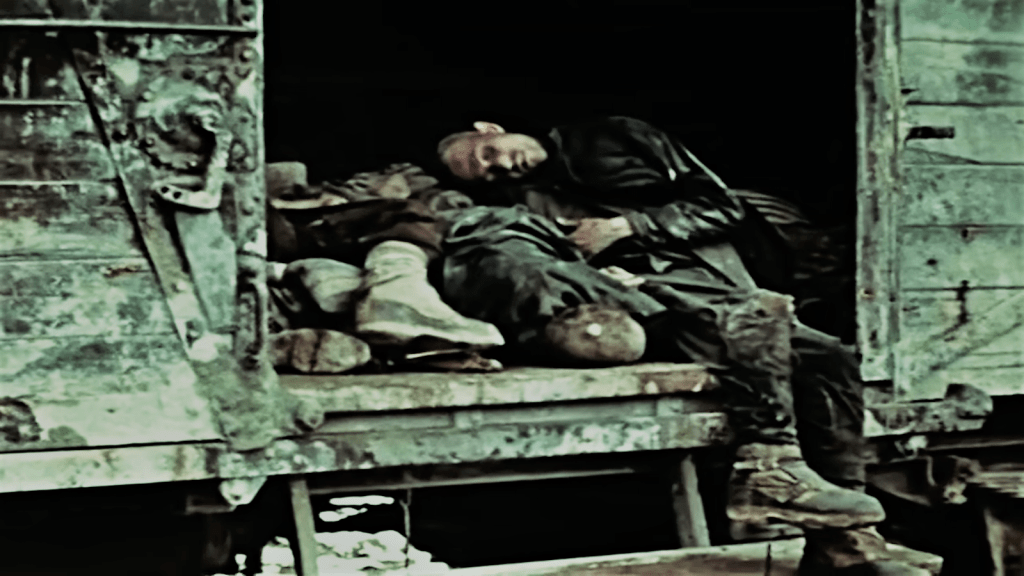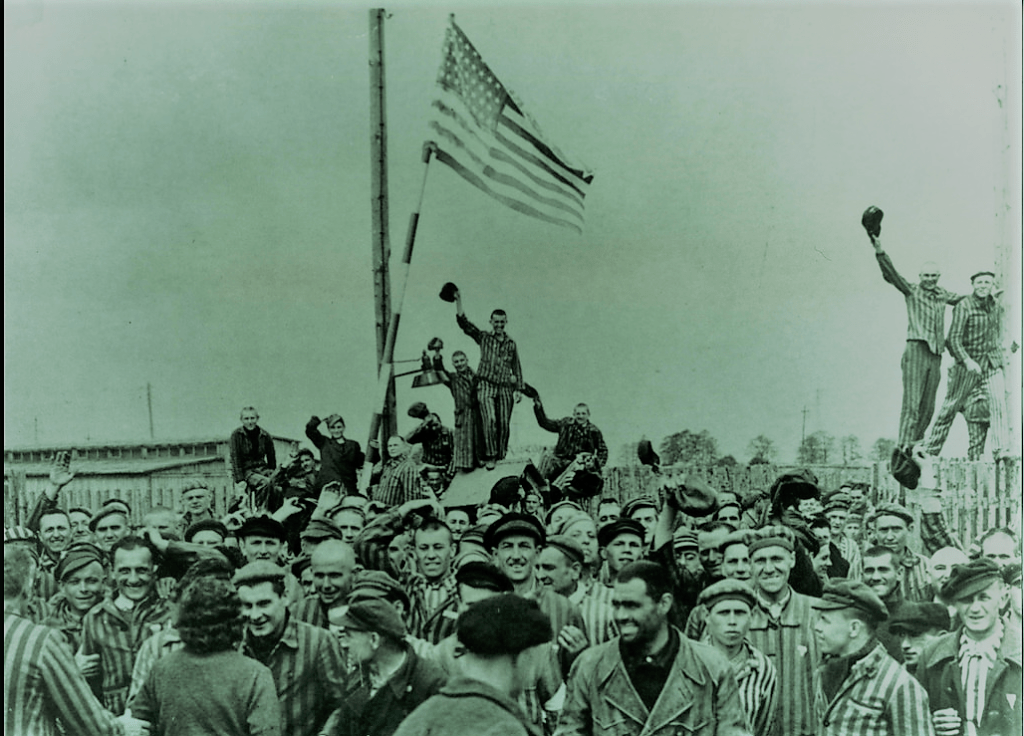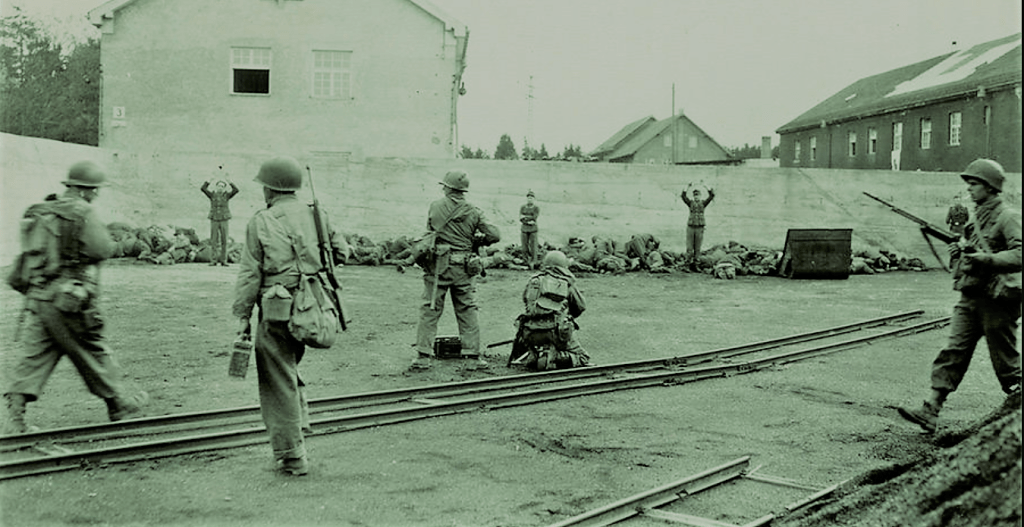
In a few weeks, I will be going to Munich for a few days. When I am there, I will also go to Dachau. In a way, I am looking forward to it, but I am also dreading it.
Dachau was the first concentration camp built by the Nazis. It opened on 22 March 1933. Twelve years, one month and one week later, the US Forces liberated the camp.
The troops were horrified by what they saw. Below are just some testimonies.
A letter by Sgt. Horace Evers
Dearest Mom and Lou,
Just received your 19th April letter and was glad to hear you all are well and the tractor business is still intact.
So you went to N. Y. and had a big time. I’d give most everything to be able to see Lou with his pants rolled up and a baby cap on. Gawdamighty. Did Mom get a jog on and smoke weeds? Have you even learned to smoke, Mom?
A year ago today I was sweating out shells on Anzio Beachhead, today I am sitting in Hitler’s luxuriously furnished apartment in Munich writing a few lines home. What a contrast. A still greater contrast is that
between his quarters here and the living hell of Dachau concentration camp only 10 miles from here.
I had the misfortune of seeing the camp yesterday and I still find it hard to believe what my eyes told me.
A railroad runs alongside the camp and as we walked toward the box cars on the track I thought of some of the stories I previously had read about Dachau and was glad of the chance to see for myself just to prove once and
for all that what I had heard was propaganda. But no it wasn’t propaganda at all. If anything some of the truth had been held back. In two years of combat, you can imagine I have seen a lot of death, furious death mostly. But nothing has ever stirred me as much as this. I can’t shrug off the feeling of utter hate I now hold for these people. I’ve shot at Germans with intent to kill before but only because I had to or else it was me, now I hold no hesitancy whatsoever.
The first box car I came to had about 30 of what were once humans in it.

All were just bones with a layer of skin over them. Most of the eyes were open and had an indescribable look about them. They had that beaten “What did I do to deserve this?” look. They had that beaten, “what did I do to deserve this?” look. Twenty or thirty other box cars were the same. Bodies on top of each other no telling how many.
No identification as far as I could see. And then into the camp itself. Filthy barracks were suitable for about 200 persons and held 1500. 160,000 persons were originally in the camp and 32,000 were alive (or almost alive) when we arrived.
There is a gas chamber and furnace room in one barracks. Two rooms were full of bodies waiting to be cremated. In one room they were all nude, in the other they had prison clothes on, as filthy as dirt itself.
How can people do things like that? I never believed they could until now.
The only good thing I noticed about the whole camp was the scores of SS guards freshly killed.
Some of the prisoners newly freed could not control themselves and went from German to German and bashed their heads in with sticks and rocks. No one tried to stop them for we all realized how long they had suffered.
I guess the papers have told you about the 7th Army taking Nuremberg and Munich by now. Our division took the greater part of each place and captured many thousands of prisoners. We also liberated Russian, Polish and British and American prisoners by the thousands, what a happy day for the people.
Well enough for now
Miss you all very much
Your Son,
Horace”

Hilbert Margol
Early the morning of 29 April 1945, two months after our 21st birthday, my twin brother, Howard, & I, after seeing a trainload of boxcars, containing many dead bodies, entered the nearby Dachau Concentration Camp. We witnessed some unforgettable sights while not understanding what caused the same.
A personal account by Felix L. Sparks Brigadier General
At 0730 on the morning of April 29th, the task force resumed the attack with Companies L and K and the tank battalion as the assault force. The attack zone assigned to Company L was through the city of Dachau but did not include the concentration camp, a short distance outside of the city.
Company L was designated as the reserve unit, with the mission of mopping up any resistance bypassed by the assault forces.
Shortly after the attack began, I received a radio message from the Regimental Commander ordering me to proceed immediately to take the Dachau concentration camp. The order also stated: “Upon capture, post an airtight guard and allow no one to enter or leave.”
As the main gate to the camp was closed and locked, we scaled the brick wall surrounding the camp. As I climbed over the wall following the advancing soldiers, I heard rifle fire to my right front.
The lead elements of the Company had reached the confinement area and were disposing of the SS troops manning the guard towers, along with a number of vicious guard dogs. By the time I neared the confinement area, the brief battle was almost over.
After I entered the camp over the wall, I was not able to see the confinement area and had no idea where it was. My vision was obscured by the many buildings and barracks which were outside the confinement area.
The confinement area itself occupied only a small portion of the total camp area. As I went further into the camp, I saw some men from Company L collecting German prisoners. Next to the camp hospital, there was a L-shaped masonry wall, about eight feet high, which had been used as a coal bin.
The ground was covered with coal dust, and a narrow gauge railroad track, laid on top of the ground, lead into the area. The prisoners were being collected in the semi-enclosed area.

As I watched, about fifty German troops were brought in from various directions. A machine gun squad from Company L was guarding the prisoners. After watching for a few minutes, I started for the confinement area.
After I had walked away for a short distance, I hear the machine gun guarding the prisoners open fire. I immediately ran back to the gun and kicked the gunner off the gun with my boot.
I then grabbed him by the collar and said, “What the hell are you doing?” He was a young private about 19 years old and was crying hysterically. His reply to me was, “Colonel, they were trying to get away.”
I doubt that they were, but in any event, he killed about twelve of the prisoners and wounded several more. I placed a non-com on the gun and headed toward the confinement area.
It was the forgoing incident which has given rise to wild claims in various publications that most or all of the German prisoners captured at Dachau were executed. Nothing could be further from the truth.
The total number of German guards killed at Dachau during that day most certainly did not exceed fifty, with thirty probably being a more accurate figure.

The regimental records for that date indicate that over a thousand German prisoners were brought to the regimental collecting point. Since my task force was leading the regimental attack, almost all the prisoners were taken by the task force, including several hundred from Dachau.
During the early period of our entry into the camp, a number of Company men all battle-hardened veterans, became extremely distraught.
Some cried while others raged. Some thirty minutes passed before I could restore order and discipline. During that time, the over thirty thousand camp prisoners still alive began to grasp the significance of the events taking place.
They streamed from their crowded barracks by the hundreds and were soon pressing at the confining barbed wire fence. They began to shout in unison, which soon became a chilling roar.
At the same time, several bodies were being tossed about and torn apart by hundreds of hands. I was told later that those being killed at the time were ‘informers.’
After about ten minutes of screaming and shouting, the prisoners quieted down. At that point, a man came forward at the gate and identified himself as an American soldier.
We immediately let him out. He turned out to be Major Rene Guiraud of our OSS. He informed me that he had been captured earlier while on an intelligence mission and sentenced to death, but the sentence was never carried out.
Within about an hour of our entry, events were under control. Guard posts were set up, and communications were established with the inmates.
We informed them that we could not release them immediately but that food and medical assistance would arrive soon.
The dead, numbering about nine thousand, were later buried with the forced assistance of the good citizens of the city of Dachau.
On the morning of April 30, our first battalion resumed the attack towards Munich.
At this point, I should point out that Seventh Army Headquarters took over the actual camp administration on the day following the liberation.
The camp occupation by combat troops after that time was solely for security purposes. On the morning of April 30, several trucks arrived from Seventh Army carrying food and medical supplies.
The following day, the 116th and 127th Evacuation Hospitals arrived and took over the care and feeding of the prisoners.
sources

Donation
I am passionate about my site and I know you all like reading my blogs. I have been doing this at no cost and will continue to do so. All I ask is for a voluntary donation of $2, however if you are not in a position to do so I can fully understand, maybe next time then. Thank you. To donate click on the credit/debit card icon of the card you will use. If you want to donate more then $2 just add a higher number in the box left from the PayPal link. Many thanks.
$2.00